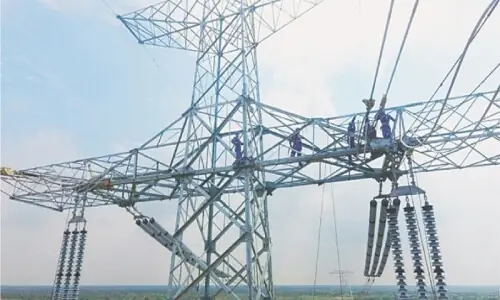Despite serious impediments such as lack of water and a poor law and order situation, Balochistan’s share in the country’s agricultural production remains significant with improvements in some areas.
While the province continues to produce surplus fruits and veggies, its cereal output is showing a rising trend and the cotton crop is also picking up.
In the outgoing season that ended in May, the province produced 63,000 bales of cotton up from 53,000 bales a year ago. Current cotton output is almost equal to production in Faisalabad, Punjab, and higher than the output in Badin, Sindh.
Balochistan’s apple production has doubled from 250,000 tonnes in 2010 to about 500,000 tonnes in 2012. And this has happened owing to higher per hectare yield
Officials of Balochistan agriculture department say the output would increase to 80,000-100,000 bales in the next season beginning September 2014 as growers are set to cultivate cotton on larger areas.
Soil characteristics in many districts are suitable for cotton cultivation, say officials and growers, adding that if their full potential is tapped the provincial output may be doubled within 2-3 years. These districts are: Nasirabad, Jafferabad, Jhal Magsi, Bolan, Sibi, Dera Bugti, Kohlu, Musakhail, Loralai, Kharan, Killa Saifullah, Zhob, Lasbella, Khuzdar, Kharan, Chagai, Panjgur, Turbat and Awaran.
But whereas in some of these districts, the rise in militancy over the last few years had affected agricultural activities negatively, in most of other areas lack of water, scarcity of quality cotton seeds and infrequent use of proper technology makes it difficult to exploit cotton cultivation potential.
Balochistan’s contribution to the country’s cotton crop stands at less than five per cent but it claims a much larger share in fruit and vegetable output. In 2012, the province produced more than 1.2 million tonnes of fruits which was equal to about 18pc of the total production in the country and was higher than individual fruit production in Sindh and KP.
Balochistan enjoys a leading position in production of apples, dates, apricots and melons including watermelon. Besides, it produces several varieties of more than a dozen other fruits including grapes, pomegranates, peach, plum, coconut and papaya.
Officials of agriculture department claim that while the country’s national fruit production has gradually declined (from 7.1 million tonnes in 2008 to about 6.8 million tonnes in 2012), it has increased in Balochistan (from 1.12 million tonnes in 2008 to 1.20 million tonnes in 2012). More recent stats are not available.
“Had the production of dates, (one of the four main fruits of the province) not declined due to drought and militancy in dates growing areas, the overall fruit production would have seen an even bigger increase,” says an official of the provincial agriculture department. “Our apple production has, however, recently doubled (from 250,000 tonnes in 2010 to about 500,000 tonnes in 2012). And this has happened due to higher per hectare yield.”
Officials link higher yield of apples to better orchard management and growers shifting preference to varieties that mature earlier. Generally, half a dozen varieties are grown including Tor Kulu, Shin Kulu, Mashhadi, Amri, Kashmiri and Kaja. Lately, growers have brought more area under cultivation of the last three varieties that mature earlier than the first three.
Some 16pc of Pakistan’s total production of vegetables (minus potatoes) is also provided by Balochistan. And whereas vegetables (minus potato) output across the country has remained more or less unchanged at 3.1-3.2 million tonnes in the last five years, the province has witnessed a gradual increase, from 435,000 tonnes to about 500,000 tonnes during this period. Output of vegetables has also increased chiefly due to higher per-hectare yield, officials claim, citing stats of the area under cultivation of fruits and veggies that have remained unchanged.
Provincial officials link yield to improved water availability to vegetable farms through tubewells and tunnel farming which requires lesser amount of per-hectare water. Tunnel farming is catching up particularly in tomato production which is produced both in Rabi and Kharif seasons. In Kharif, the province produces some 50,000 tonnes and in Rabi more than 150,000 tonnes of tomatoes. The province also produces large amounts of carrots, radish, spinach, cauliflower, cabbage, ladyfingers and eggplants.
Rice production got a boost in 2009 but declined somewhat in 2010 after the super floods and again began to rise. In the outgoing season, the provincial production of rice including both Basmati and non-Basmati was estimated at a little less than 700,000 tonnes or some 10 per cent of the country’s overall production. This estimate is from SUPARCO’s satellite imagery survey. If data on actual production, which is being finalised, does not vary too much it would be a big achievement.
Provincial officials say Balochistan’s own rice requirement is not more than half a million tonnes and production beyond that should enhance availability to nearby Karachi markets where both local and export-led buying would benefit from it.
This year’s wheat harvest is being estimated around 0.8 million tonnes. But optimistic growers say actual output would match an all time high of 872,000 tonnes achieved in 2006-07. Their optimism stems from such factors as wider use of high-yield varieties, weight-gaining of grains in early winter rains and cultivation of wheat in some additional areas where militancy has subsided.
Published in Dawn, Economic & Business, May 19th, 2014



































